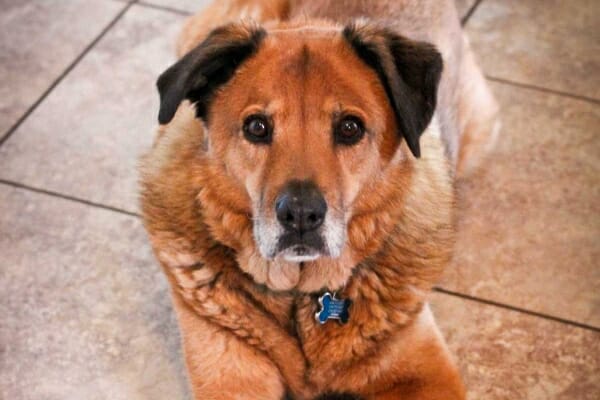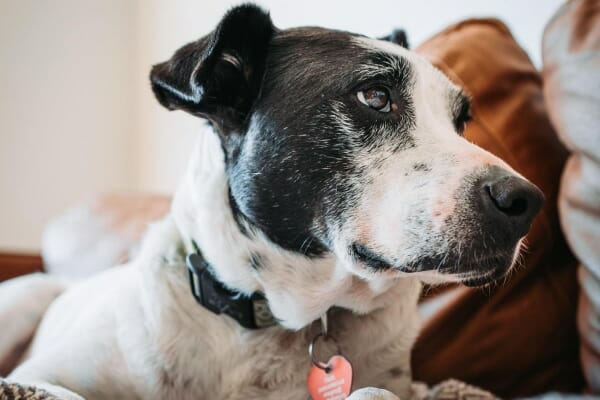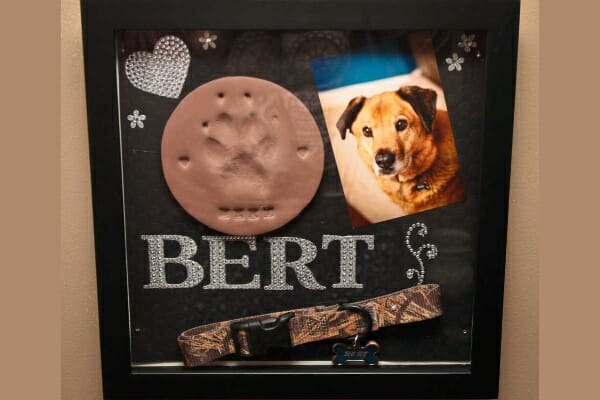Some dog parents may consider in-home dog euthanasia when faced with the overwhelming task of deciding how to say a final farewell to their beloved companion. Integrative veterinarian Dr. Julie Buzby interviews Dr. Dawnetta Woodruff, a veterinarian who has focused exclusively on in-home end-of-life care for pets for the past nine years. Dr. Woodruff tackles these twelve hard questions with heart and compassion to offer peace and reassurance to dog parents everywhere.

Dr. Buzby: In-home euthanasia has always been a topic I feel strongly about. It’s what my family chose when we had to say goodbye to our sweet dog Luke, and what I often recommend to dog parents. No one wants to have to think about losing their dog. But giving this hard topic some thought now can help you be a bit more prepared when that time comes.
I asked my friend Dr. Dawnetta Woodruff to share from the heart about a topic that is so near to her heart—in-home dog euthanasia. The questions I asked her to respond to are ones that dog parents, much like yourself, may have. Dr. Woodruff doesn’t disappoint in her answers. Each one is framed with compassion and understanding born of years of experience loving dogs and their parents through the darkest of days.
1. Dr. Buzby: What prompted you to consider focusing on in-home euthanasia for pets?
Dr. Woodruff: At points in my career, I have been a “mixed” animal veterinarian (one who cares for farm animals and pets), a general practitioner, and an emergency veterinarian. Each of these steps in my career was enjoyable and difficult in its own way. But one chord of similarity ran through each job—I loved connecting with clients and helping families through difficult decisions.
It was in 2012 that I first began to consider making house calls for in-home euthanasia. My own parents had a geriatric dog, and his good quality days were coming to an end. They loved Abe tremendously. He’d had a wonderful, long life with them. But, mobility problems and cancer were causing him great difficulty.

Saying goodbye to Abe
My Dad called one day and said, “I know that the time has come to let Abe go—but I just can’t put him in the car for THAT visit.” You see, Abe hated car rides! He had always been a dog who loved staying at home. While he enjoyed running beside a farm ATV, car rides made him very anxious. Making a decision for euthanasia was hard enough by itself. My family couldn’t imagine an anxious car ride adding more difficulty to the day.
I took what I needed to give Abe a comfortable passing at home. My parents love to watch the sunsets, so we chose that time to sit together in the grass of their front yard. Our whole family was present. Abe was surrounded with love as he peacefully passed away from the comfort of home—with no car ride and no anxiety. It was exactly what my family wanted for him, and it brought them peace.
As I looked back on that day, I realized that many more people and pets could benefit from being at home during their pet’s final moments. After all, pets are part of the family, and saying goodbye to them is incredibly difficult. Anything we can do to make it easier is worthwhile.
2. What are some of the benefits of in-home euthanasia?
If your dog is painful or anxious, having an in-home euthanasia means he or she doesn’t have to experience a difficult car ride. Home is a place where we feel comfortable, and our dogs feel comfortable there as well. Being at home allows your dog to be more relaxed. It also allows you to experience your grief privately.
Your dog gets to snuggle in his or her bed with a favorite blanket. You can feed him or her some favorite foods, and even give extra yummy treats that are usually “off limits” (like chocolate, grapes, or even a beer!) Being at home allows you to decide to be outside in your dog’s favorite shady spot in the yard if you want. You can have your favorite music playing, and look through old photos and videos. The experience can truly become a celebration of your dog’s life!

3. Are there situations where an in-home euthanasia may not be a good idea?
Saying goodbye at home is a beautiful option that I am proud to offer to dog families. However, saying goodbye in a vet clinic is sometimes necessary. There is not always time to plan for an in-home dog euthanasia as sometimes our dogs have an illness that worsens rapidly. It may not be in your dog’s best interest when your dog is experiencing:
- Difficulty breathing
- Rapid blood loss
- Acute (sudden) onset of severe pain in dogs
In the middle of an emergency situation, getting fast help for your dog is most important! He or she needs rapid care, and that typically happens at the vet clinic. You can find solace in knowing that just hearing you and smelling you close by will be comforting to your dog.
4. Do you have any words of advice about knowing when it is time to consider euthanasia?
The end of a dog’s life can feel like a roller coaster. It is difficult to know the best time to set him or her free. One thing that can help is to know that there is not just “one right day.” Most often, there is a window of time where it is medically appropriate to end your dog’s struggle. Sometimes it is better to make the decision earlier in that window and other times later. Neither time is “right” or “wrong”—just different.
Many things factor into the decision. What is best for one dog may be different for another. Likewise, what is best for one family may be different for another. Do your best to factor in your dog’s comfort, your own ability to physically and mentally cope with the situation, and ask for help when you need it.
You may feel alone, but there are many people who understand, and who want to help. Dr. Buzby has also written some beautiful words that can help you know when to say goodbye to your dog.
5. How do you suggest dog parents prepare for the impending loss of their companion?
There is nothing that will make your dog’s death “easy”—but there are ways to make it a little better. The more we try to ignore the idea of his or her death, or pretend it isn’t happening, the harder it will be when that day comes.

We speak a lot about Quality of Life (QOL) but Quality of Death (QOD) is equally as important. What is most important to you—enjoying every possible day together, or making sure the final day happens in a certain way? There is no “right” answer to this question. Asking yourself what will bring you the most peace as you look back on your dog’s death can help you to decide what you want for him or her in the final days.
Make a list of you dog’s favorite things and do those things more often! Or make a bucket list of things your dog might enjoy. Commit to one or two items each day or week. Being conscious of how you spend your final time together can bring peace and comfort to your heart after your dog has been euthanized.
6. What do you want dog parents to know ahead of time?
The logical part of your brain will understand that you are making a loving, merciful decision for your beloved dog. But your heart may never feel ready to let them go—and that is normal.
There will come a time when watching them struggle is harder than setting them free—and that is when you know you are as ready as you will ever be.
7. What decisions need to be made before the in-home euthanasia appointment?
You should know ahead of time who would like to be present. Some family members may want to say goodbye, and then leave before the vet arrives. Other family members and friends may want to stay for the entire visit (if this is ok with you). If you have children, you should talk to them about their involvement. Do they want to be present, or do they want to go to the park with a grandparent or family friend?
You will also want to choose a place in your home where everyone can be comfortable, and where your dog is also relaxed and comfortable. Think about some of your dog’s favorite places as a starting point.

As a family, you will want to discuss your wishes for your dog’s aftercare.
- Do you want to arrange for a burial? If so, do you have property where a burial is allowed, or do you need to make arrangements with a pet cemetery?
- If you want cremation, is it important to you to have your dog’s ashes come back home?
Your veterinary team can help you work through these decisions, and can answer any other questions you may have. Dr. Buzby also discusses some of these considerations in her blog on preparing for your dog’s euthanasia.
8. What can dog parents expect during the euthanasia process?
Euthanasia means “good death.” Your dog’s veterinary team cares deeply about helping you through this difficult day. They will do everything they can to make things as easy as possible for you and your cherished friend. If you have questions, don’t be afraid to ask.
Your dog will likely receive some pain medication, or something to help relieve anxiety. This medication may just “take the edge off” or it could allow him or her to fall into a deep sleep. Once your dog is relaxed and comfortable, your vet will give a high dose of a strong anesthetic medication. This medication can be given in many ways—it may be given through an IV in the vein, or it could be given as an injection in the abdomen.
No matter how it is given, it does not cause stress or pain—it causes the brain to go so deep asleep that it stops. When the brain has stopped, then your dog’s heart and breathing will stop. Sometimes this happens quickly, and sometimes this happens more gradually. Occasionally your dog will need an extra dose of medication, and that is ok too.
Every dog is a little different, so each time you say goodbye to a dog, it may be a slightly different experience. Rest assured that your dog is in good hands. Remember that helping him or her pass with lots of good medication is the best way to give him or her a peaceful, comfortable goodbye.

9. What happens to my dog’s body after the euthanasia?
Your dog may stay with you if you have made the decision to arrange a home burial. If your veterinary team is making arrangements for you, they may wrap your dog in a comfortable blanket, or in a favorite towel or special article of clothing. If you have a blanket or a toy you want to send along with your dog, make sure to ask your veterinarian what items are allowed.
Depending on your dog’s size, they may use a blanket, a basket, or a stretcher to carry your dog safely to their car. Often, potty pads or absorbable cloths will be placed under and around your dog to keep him or her clean in case the bladder or bowels relax after death.
When your dog gets to the cemetery or crematory, he or she may be placed into a casket or a burial bag, similar to those used for humans. Your dog may also be placed in a temperature controlled storage area until the burial or cremation happens. This is done to be respectful, and to keep the body from quickly going through natural post-mortem (after death) changes.
10. How can dog parents find someone to perform an in-home dog euthanasia?
Ask your normal veterinarian if they offer in-home euthanasia, or if they can recommend someone who does. You might talk to family and friends to see if they can give you a personal recommendation. And, if needed, you can also look for providers online. A Google search will likely give you some options in your area. I am part of Lap of Love Veterinary Hospice and In-Home Euthanasia, an organization made up of veterinarians who specialize in end-of-life care. Lap of Love has veterinarians in many areas of the U.S., so you may be able to find a Lap of Love veterinarian near you.
11. What are some of the ways dog parents may choose to memorialize their dog?
Many families want to keep a bit of their dog’s fur. They might keep it tucked away in a safe place, or make a special ornament to display the fur. Dog parents might like to have ink or clay paw prints—and some people even make artwork out of their dog’s painted paw prints!

I often see families make a shadow box with their dog’s paw print, a fur clipping, a collar, a photo, or even a special toy. Other families may pick out a special urn for their dog’s ashes, create a headstone or a stone marker for the garden, or choose to have a unique piece of glass art made from their dog’s ashes. A paw print or a nose print can be memorialized as a necklace, a key chain, or even as a tattoo!
You may choose to have a portrait session with a local photographer during your dog’s final months of life. Or you may decide to have a special painting made from one of your favorite snapshots. The possibilities are nearly endless, and finding something that is unique and sentimental can be an important part of your healing process while grieving the loss of your dog after euthanasia.
12. What is the most rewarding part of your job as an in-home euthanasia vet?
I love hearing stories about a pet’s life! I love when a family smiles or laughs as they recall their favorite memories. And, I love knowing that I can help to make a difficult day a little bit easier. That makes all of the tough parts of my job more than worthwhile!
Final thoughts from Dr. Buzby
Facing your pup’s passing is every shade of difficult. I get it. But I hope that in reading Dr. Woodruff’s beautiful and eloquent answers to these twelve questions about in-home dog euthanasia, you can find a measure of hope and comfort. Remember—you are not alone. Your friends, family, and veterinary team are there to support and love you every step of the way.

How did you say farewell to your beloved dog?
Please comment below. Sharing your dog’s story can be a beautiful way to remember your departed companion.


My 16 year old terrier has congestive heart failure and kidney failure because of the heart drugs. He trembles in the morning for at least an hour and I can’t work out if he is cold or hypoglycaemic or in pain or ??
He is still able to walk in the afternoon but very spaced out at home, staring a lot into space. He is eating home cooked food ok so I feel we aren’t at the end just yet but just trying to keep him as comfortable as possible
Hi Alex,
I am sorry your senior guy’s health is declining but glad to hear the home cooked meals are making him happy. I am not sure why your boy is trembling, but this is something we see alot in small breed dogs, especially as they age. Here is a link to another article with more information: Is Your Dear Old Dog Shaking? 11 Reasons Why Senior Dogs Shiver
Also, the spaced-out behavior you mentioned can be a sign of dementia. It could be worth mentioning to your vet just in case they want to start him on a supplement to help with cognitive function. You can read more about that here: Signs of Dementia in Dogs: Stages, Symptoms & Treatment
Wishing your sweet boy comfort and peace. Bless you both.
The spaced out behavior could also be a reaction to drugs. Twice, my 14 yr old Lolly, had bad affects from drugs for her chronic kidney failure. I think that the allergic reaction elevated the toxins in her kidney and this time I’m hopeful she continues to get better. She laps up plain chicken bone broth and I believe it’s helping her again.
Hi Tony,
You are correct that if certain medications reach an elevated level in the blood stream, they can cause lethargy and make a dog seem “spaced out”. The reason this occurs in dogs with kidney failure is most drugs require the kidneys to filter them out of the blood stream to get medications out of the body. If the kidneys are not working properly, then the drugs are not removed from the blood stream, and they start to build up to inappropriately high levels with each subsequent dose. I am glad your girl seems to be improving and pray for continued success. Wishing you both all the best!
My 13 year old Golden Retriever has severe arthritis and is barely able to stand. He is on pain medication but it’s toh for him. He will bark to have me help him up if he wants to go to another spot. My heart aches every day for him but he still has his appetite and recognizes me and will roll over for belly rubs. I know the time is coming. It’s just so hard.
Dear Ken,
My heart goes out to you as you face this emotional decision for your senior boy. Make the most of the time you are gifted. Praying for clarity and comfort. Bless you both. ♥
My Coton, Truffles is almost 15yrs old. He has Dementia for about a year now. I’ve been struggling, trying to decide when/if to have him put down.
On New Year’s Eve Day I had to unexpectedly put my baby, Scotty down. He had a level 4 heart murmur and was severely anemic. I had a vet from Lap f Love come to the house to help him. When she gave him the first shot ( I think she gave it to him back near his tail) he really yelped & jumped. I didn’t think it was supposed to hurt so much.😢 She said it was probably because he was so relaxed and didn’t expect anything. I don’t want to have the same experience with my Coton.
Dear Kelly,
I am sorry for your loss of Scotty and wish you were not facing the same difficult decision for Coton. I understand the events leading up to Scotty’s passing were a bit worrisome, but I assure you this is not the case for every dog. I routinely use a similar sedation technique when I perform euthanasia and most dogs do not react in that way. Occasionally I do have one that is very sensitive and will cry for a split second. But as soon as the sedation takes effect, all fear and pain is gone. I encourage you to discuss your concerns about the sedation injection with your vet or the vet you plan to have come to your house for Coton’s passing. They may have an alternate protocol that can be used to ease your mind. Wishing you the best as you navigate this emotional path. Bless you and your sweet boy. ♥
What do you do when, the past few years your finances do not allow this and your dog is going through dementia?
I have an 18/19 yr old rat terrier I inherited from my family member whose current life doesn’t allow him to luxury to take his baby with him. Over the last few years I’ve noticed the changes. We’ve kept him safe and comfortable and when he’s having a good day he’s ok. However, the bad days are starting to increase and neither of us can afford to get him euthanized. I don’t know what to do.
Dear Denise,
My heart goes out to you as you face this difficult situation. My best advice is to contact your local animal shelter or humane society. Often, they will perform euthanasia at a reduced price. Hoping you can find the help you need to give your sweet boy the peace he deserves. Bless you.
Hi Everyone ,
At present our 15 year old Sam , a cross chihuahua and another breed , ( we never found out the other breed , but will explain within comments )..
Last year we noticed many things changes that Sam was doing. He has always been a well-mannered dog , loves his family and plays all the time. We took him to the vets , who diagnosed dementia. He also has bad arthritis.
Giving tablets ( from vet ) in our view makes him very unstable. Unstable in the sense of, not sitting and relaxing like he did. Sam has always been loyal to my wife , and to ther members of the family, but more so to my wife.
So in the changes, he showed signs of extreme separation anxiety , even if my wife went to get a cup of tea , even if she moved, he thought she was leaving his side. At present, it’s bad. He won’t leave her for a moment. As an example, when she goes for a shower ,Sam is with me in the living room.
But it’s a time where he is pacing constantly, looking for her, sometimes standing ,staring at the wall. In the end, my anxiety is at the peak and I let him go upstairs. Sometime he waits in the bedroom for her or paces the landing. As soon as she returns, his anxiety levels drop.
He does not eat properly ,or at all. But happy enough to eat treats or hot dogs and noodles. So to feed him , it’s a case of ,if he is happy to eat these things then so be it.
If we go out, he soils, either a pee or poop.
Tonight I let him out , then about an hour after he peed in the hall. Its not the first and it certainly won’t be the last. This his incontinence , Sam has always been house trained from an early age. So back to the early age of Sam, as I said from the start..
We decided to have a dog in the family when our kids were young. A friend said she knew someone was looking for a home for some pups. My friend only knew of this from another. Visiting the home of the pup, qI was not expecting what I saw. I asked to see the mum and dad, but the owner only brought out Sam. He was in very good condition, so asked how much. Believe me said £20.00 I was shocked. It was only when I was home I found out he was a hereon addict.
So he wanted rid of the pups for a fix , disgusting!!!. Anyway, my brother came over and said that Sam could not of been any way older than 3 to 4 weeks old. ( 8 to 12 weeks is the normal)..
I admit we were a bit naive of getting a pup. So, we got some puppy food , soil pads, you name it , we made sure he was going to live. And he went on to be a great dog. ( I’m sorry , I don’t blow our trumpet, but we were proud we did our best for Sam. )
We also have another dog, it’s my daughters, but I’ve claimed him , as he is always with me. A bit of quick side note. I am disabled , so and my wife works part time and two children work full time. Now when the wife leaves at 12noon , Sam is still asleep from about 8am. When the wife returns at about 14.30, he is happy to see her , but then the pacing etc starts. So I have Sam and Toby ( a Chihuahua ) , is with me.
Hence Toby is my little boy !! ( sorry )
Now this is where mecand the wife’s anxiety goes through the roof , and with a little bit of bickering between us. At 18.30 to 18.45 Sam goes into a stage of extreme anxiety , pace by the door , to be at the wife’s side constantly. Will not play or eat. Even Toby notices his changes at this time, you can actually see it on Tobys face.
Then around, 20.30, Sam decides to go to sleep. And we are exhausted mentally. So lately, I have said its not fair for Sam to feel and act this way , and sorry to say , on our selves as well. At night, he goes out at 22.30, when all goto bed. BY 01.30, he is up again to go put.
Tonight, he was up about 02.30, I cannot do it, ( myself unstable ), and it’s so unfair my wife does it then sleeps down stairs as he will be up again in a few hours. And I feel guilty all the time. Is it fair for Sam to be put to sleep, due to he bad health and for our own health and sanity ?
My wife says she rather let Sam naturally go , but it’s not fair for him to suffer..
So, jumping ahead, if we were to goto the vets for him to goto sleep, I think it would much harder than if it was performed at home with family, his surroundings, his bed , toys and everything he holds close to his heart. I have always loved animals. And many in family and friends have said I have a way with animals, ¹In the past, I’ve kept rats.
And every time either they died naturally or put to sleep due to ill health, it always hits me hard. Year and half ago, two very good rats, one had a tumour and had to be put to sleep, but the other who was OK, she would pine for her sister. So between me and the vet , decided it would best for her also.to go with her sister. Broke my heart . Animals are so hard to let go, some have such a small life span.
Example is a gerbil in captivity has a life span of 3-4 years, you get attached and sad when they go. But a dog who can live 15 years and much more that’s a different story. It’s a family member , you both know each other inside out. Toby tells me when it’s nine oclock every night , and for me to goto bed, and he comes up with me. Toby knows when I’m at my lowest he sits on my lap, sad eyes, comes close, gives a kiss then snugs in. Sam was like that many a wile ago , but as long as he is happy with wife, then we are happy.
So , Sam , what are we to do with our dog.? I have said that tomorrow we all need to sit, and talk this through.
But whatever outcome and answer we decided, it going to be the wrong one !!
Everyone loves Sam , anyone who knows him or just met him. When we get a new person to the door, a workmen is a good example.
The first thing Sam does, is smell thier shoes. Then if that person visits again, he knows them. I remember ( when he was in his prime ). We had a boiler maintenance engineer, Sam went into his tool box and took out a screwdriver to play with. He is a very smart dog with tricks even we did not show him.
And everyone will miss Sam when the time comes.. Toby will , he loves Sam, and even knows when Sam is low.
Can I just say, I apologise if I have waffled on And , thank you for reading.
Animals bring us so much into our lives and make us damn good and happy when we are at our lowest.
But , life , even though that’s the course it takes, is bloody cruel to take them away from us…
Thank You
Rich
Dear Rich,
I am so sorry you are facing this emotional decision for Sam. It is clear he is an amazing pup and has lived a life full of happiness and joy. From what you describe, it does sound like Sam is struggling and saying goodbye may be the only way to offer him freedom and peace. Allowing your own heart to break so your sweet boy can find rest is the ultimate selfless act of love. Wishing you clarity in this decision-making process and strength to face the days ahead. Bless you and yours. ♥
Rich,
I don’t know if your Sam is still with you, but i did want to tell you that CBD oil has helped my 18 yr old toy poodle/maltese mix ‘pup’ (Sammie) with the Sundowners symptoms that she had. She still get stuck in places otherwise, but the pacing is gone.. Bless you – I’m facing similar issues with both of my girls right now. So incredibly hard. <3
I really like your blog & articles. They have helped me through the last week. My 17 year old yorkie with renal failure has managed pretty well on Cerenia & subcutaneous fluids as needed. She started eating less over the last 3 weeks. She would eat baby food or soft dog food but finally quit. Continued to drink water alot. After one last trip to vet for fluids & Cerenia injection, she had dropped to 2 pounds & didn’t perk up, She never became incontinent. I called to schedule in home euthanasia. The Dr was kind enough to come 2 days later on a Saturday. She was still walking that morning but very unsteady. She didn’t pant but restless through the nights. After she gave the sedation shot, she passed very peacefully. We waited awhile & realized she didn’t need the 2nd injection. I was glad but then felt guilt that I waited too long. Is this common for small elderly dogs? I feel sorry for anyone going through the decision process. It’s gut wrenching & confusing.
Dear Connie,
My heart aches for you with the loss of your little pup. I just responded to your other comment that was posted on the 15th on the kidney failure article. Hopefully you will see that too. You made the right choice at the right time, and it came from a place of love. May your sweet girl’s memory live on and be a blessing in your life. Wishing you happier days ahead and healing for your heart. ♥
Thank you for your compassion in writing these blog posts. I am really struggling and feeling guilty too that I am even looking up euthanasia for dogs. My little man is almost 18 years old. He’s getting stuck in corners and soils the house all day long — shortly I took him out, he pooped in his bed and was sitting in it while I was just 2 feet away from him. He didn’t react and just sat there — I found it because of the smell. He still has moments of joy like standing up in my cargo bike to sniff the air — I live in Amsterdam. He still remembers me and gives me licks to my face when I hold him up to take him outside. But these days, mostly, he just looks at whatever random wall he’s facing after I put him down on the floor from carrying him back inside the home.
I have a 3.5 year old daughter who loves him to bits of course, I am at a lost of how to tell her or involve her in this whole process. I do think in-home euthanasia is the better way to do it for us because he really doesn’t like the vet. Do you have any tips on how I can involve a small child in all of this? I’m so heart-broken right now and really not ready for letting him go but I know it’s time very soon.
Dear Cindy,
I am sorry your senior guy is nearing the end of his life and dealing with the effects of cognitive dysfunction. From what you describe, saying goodbye may be the most loving option and only way to free your sweet boy from his struggles. I will attach links to other articles with more information on how to decide when it is time to let go. As for how to involve your daughter, it really depends on your parenting style and what you are comfortable with. I have performed many euthanasia procedures with small children in the room, including my own dogs in my house. Honestly, at the age of 3.5, most children will wander off and get interested in something else and not pay much attention to what is happening. They may ask a few questions in the days after but usually don’t remember much, if anything, once some time passes. You could let your daughter give your boy some treats and love on him before the sedation is administered. You may even want to take some pictures of them together to help her remember him later on. I hope you will find the answers you need to make those last moments smooth and peaceful. Praying for your strength and comfort. Bless you all. ♥
1. Dementia in Dogs: When to Euthanize Your Beloved Senior Dog
2. Preparing for Your Dog’s Euthanasia: 10 Thoughts for Peace
3. Dog Memorial Ideas: 10 Ways to Honor Your Dog’s Legacy
I am struggling because I did choose to do in home euthanasia and my baby did have a peaceful ending… but now I feel overwhelming guilt because I ended her life. I am torn because I was her human, her mom, and my job was to protect her. In my mind, I didn’t protect her, I tricked her by scheduling someone to come and kill her. She had no idea what was happening… but I did, and I allowed someone to hurt her… to kill her. I don’t know if I can ever forgive myself now. She was almost 14 and had severe mobility problems towards the end. She could hardly get up at all, even with our assistance. We had been told a month prior that her kidneys and liver were failing. But she was still eating and drinking and very much in her right mind. That’s what made it so hard! She was still there!! And she wagged her tail when the vet came in. It broke my heart to know that we were betraying her. What finally tipped the scale for us, was she was having intermittent shortness of breath spells when just walking a few steps. She would suddenly start panting frantically and then lay down instantly and it would take her a few minutes to recover. I knew that this was a sign of impending doom. Any words of advice to help me come to terms with the decision we made and to overcome the guilt? Thanks.
Dear Faith,
I am sorry for the loss of your senior girl. Together, you and your vet made a loving decision to give her peace from her struggles. I definitely do not think you betrayed her but instead feel that you allowed her to find the rest she earned after a lifetime of love and devotion. You made an unselfish choice to put her wellbeing first and allow your own heart to break so she wouldn’t have to suffer. It is normal to grieve, and I can only imagine how much you miss your sweet girl. I hope with time your heart will heal and you can think about all the wonderful times you shared. May her memory be a blessing that stays with you always.
As difficult as it was, you did the “humane” and kindest thing. We are planning to euthanize our 16 yr old dog and have many of your same feelings. I waited too long with a previous dog and he suffered terribly. Focus on the good times you and your dog had.
I know in will have to say goodbye soon to my 16 year old heart dog, Henry. I have considered in-home euthanasia, but I feel like I do not want that memory in my home. I know eventual death is a part of life, and knowing my companion has had a peaceful goodbye to a life well lived and loved should be a reason to feel peace, but I feel it will be too much to bear.
I am considering going to the vets office, stopping by a park on the way so we can enjoy some final moments in the sun.
In your experience, can there be regret for choosing in home euthanasia if the dog doesn’t have any anxieties about car rides or the vet’s office that would make in-home the preferred option?
Hi Carissa,
While some people may prefer to say goodbye to their beloved pup in the comfort of their own home, this is not the choice for everyone. If you are worried about unwanted negative memories of this process being associated with your home, choosing to have the euthanasia done in-clinic is probably a better option for you. Many people have said goodbye to their dogs in a veterinary clinic and have had a peaceful and positive experience. There is no wrong choice in this situation. Make the decision that is easiest for you and will bring the most comfort to your heart. ♥
My son’s dog does not like vets. They usually have to put a muzzle on him. This can’t happen when it’s time for him to go. My son is having a hard time saying not yet. He has accidents every day. Dr thinks he has cancer. He does have tumors and has something on face that drains. It is time. . He is a pit and husky mix 15 years old. Is there something that can be given to him to relax him before he goes. Or we could give him before the vet comes in so they don’t have to muzzle him. That seems to be awful. It may just be the male dr. No disrespect. He has always been a good protector.
Hi Patricia,
I understand your concern with your son’s dog and not wanting to muzzle him for euthanasia. I am glad you are reaching out and advocating for a smooth and easy transition for this pup. Yes! Sedation prior to seeing the vet is absolutely possible. There are several different oral medications that can be used to make sure this senior guy is sedated, relaxed, and calm. Normally, it is difficult to find the balance between effective sedation and safety for the dog. But when euthanasia is the intended outcome, you can lean more heavily on the medication dosages than would normally be recommended. It might be a good idea to contact a veterinarian with Lap of Love (www.lapoflove.com). They deal with this exact situation frequently as they are house call vets that only do in home euthanasia. They can walk you through the process and answer any lingering questions either you or your son have. I hope you can find the resources needed to make this a peaceful experience for everyone involved. Bless you and your family.
My dog has advanced dementia, I haven’t slept tonight at all and I came across your website. I read everything, and I just want to tank you from the bottom of my heart because you have given me the courage to finally euthanize her, a decision I’ve been avoiding for years. I’m 25 and she’s 18, she is my life. But these past years have been very difficult. I’m taking care of her 24/7, working from home to ensure I give her the best possible life quality, but for the last year I’ve felt I been reaching the point were I’m no longer enough to provide a good life quality. She cries all day when I’m not near, ALL night, she’s lost most of the time, gets stuck in every single place. She still has incredible appetite and enjoys our slow walks, but today it seems her suffering outweighs her joy. I’ve been hoping she would die naturally but I don’t think that will happen at this point. Apart from dementia she has one (poor) kidney left. So as you say, it’s better too early than too late. It breaks my heart, I’ve been crying for hours reading your website, knowing I have to put her to sleep. I’m so incredible grateful for your smart, gentle insight, I’ve been trying to find answers for all my doubts and I finally have. Thank you for being so detailed in explaining the process and aftermath, and for being so understanding of these difficult moments.
Dear Fran,
My heart goes out to you and this difficult situation you are in with your senior girl. You are not alone, and I am here to tell you that you are making the most loving and unselfish decision for your pup. I know you will grieve her loss, but I hope that when she gains peace and rest you will feel a weight lifted as well. You have done everything in your power to keep her happy and content. I have no doubt she knows how much you love her. Praying for strength for you and may her memory be a blessing always.
Your comment has helped me two years later. I am also currently working from home I haven’t left my 16 year old dog in 4 years.
I am struggling with letting her go. Her mobility is going her front legs keep giving out and her back legs have severe hip dysplasia. I feel dead in side thinking about a life without her but I’m ready to be free. I feel trapped im a
Recluse with no life because she can’t be left alone. Thank you for sharing your story.
Dear Amanda,
My heart goes out to you as you face this emotional situation with your senior girl. I can only imagine the conflicted feelings you must have as you give of yourself daily as a full-time caregiver. Your quality of life matters too! You are not alone, and I am glad you are reaching out for empathy and support. I will attach links to other articles with more information and great advice from other readers as well. I pray for your strength and for clarity when tough decisions have to be made. Bless you and your sweet girl.
1. When Caring For A Sick Pet Becomes Too Much: Pet Caregiver Fatigue
2. Using a Quality of Life Scale for Dogs
3. How Will You Know When It’s Time to Euthanize Your Dog? 5 Caring, Heartfelt Messages
4. Preparing for Your Dog’s Euthanasia: 10 Thoughts for Peace
I know the time gas come for our sweet Sugar to go. I cannot stand the thought of cold floor..steel tables…and not in her own home where she raised 13 pups and brought so much joy and even saving my life. I live in American Fork Utah and I have not idea how to find a veterinarian to come to my home. Can you assist with recommendations please?
Thank you Very Much.
To be kind costs zero.
Sincerely
Thomas and Patricia Vogan
Hi Thomas and Patricia,
I’m so sorry to hear that the time has come for Sugar. It sound like she had a fantastic life with you guys and you shared many wonderful memories together. In-home euthanasia can definitely be a beautiful and peaceful way to say goodbye. Lap of Love (a wonderful in-home euthanasia organization) does have a veterinarian who serves the American Fork Utah region. You can find more information about her at: Lap of Love- The Wasatch Front-Salt Lake City. You could also consider calling your veterinarian to see if he or she does in-home euthanasia or has anyone in particular that he or she would recommend. I hope that one of those options will allow you to find someone to help you and Sugar through this difficult time. So sorry for your impending loss. ❤